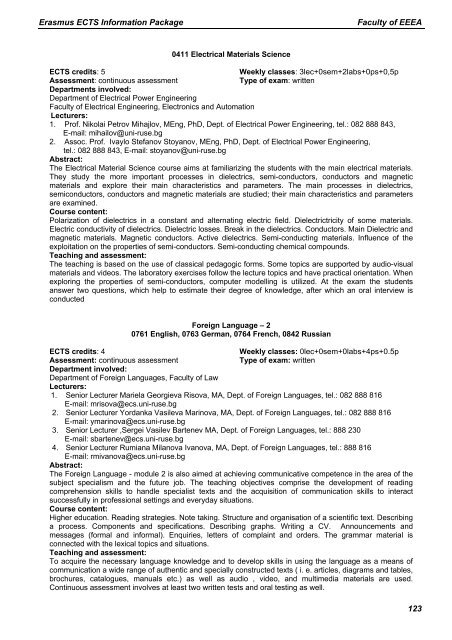Erasmus ECTS Information Package
Erasmus ECTS Information Package
Erasmus ECTS Information Package
You also want an ePaper? Increase the reach of your titles
YUMPU automatically turns print PDFs into web optimized ePapers that Google loves.
<strong>Erasmus</strong> <strong>ECTS</strong> <strong>Information</strong> <strong>Package</strong><br />
Faculty of EEEA<br />
0411 Electrical Materials Science<br />
<strong>ECTS</strong> credits: 5<br />
Weekly classes: 3lec+0sem+2labs+0ps+0,5p<br />
Assessment: continuous assessment<br />
Type of exam: written<br />
Departments involved:<br />
Department of Electrical Power Engineering<br />
Faculty of Electrical Engineering, Electronics and Automation<br />
Lecturers:<br />
1. Prof. Nikolai Petrov Mihajlov, MEng, PhD, Dept. of Electrical Power Engineering, tel.: 082 888 843,<br />
E-mail: mihailov@uni-ruse.bg<br />
2. Assoc. Prof. Ivaylo Stefanov Stoyanov, MEng, PhD, Dept. of Electrical Power Engineering,<br />
tel.: 082 888 843, E-mail: stoyanov@uni-ruse.bg<br />
Abstract:<br />
The Electrical Material Science course aims at familiarizing the students with the main electrical materials.<br />
They study the more important processes in dielectrics, semi-conductors, conductors and magnetic<br />
materials and explore their main characteristics and parameters. The main processes in dielectrics,<br />
semiconductors, conductors and magnetic materials are studied; their main characteristics and parameters<br />
are examined.<br />
Course content:<br />
Polarization of dielectrics in a constant and alternating electric field. Dielectrictricity of some materials.<br />
Electric conductivity of dielectrics. Dielectric losses. Break in the dielectrics. Conductors. Main Dielectric and<br />
magnetic materials. Magnetic conductors. Active dielectrics. Semi-conducting materials. Influence of the<br />
exploitation on the properties of semi-conductors. Semi-conducting chemical compounds.<br />
Teaching and assessment:<br />
The teaching is based on the use of classical pedagogic forms. Some topics are supported by audio-visual<br />
materials and videos. The laboratory exercises follow the lecture topics and have practical orientation. When<br />
exploring the properties of semi-conductors, computer modelling is utilized. At the exam the students<br />
answer two questions, which help to estimate their degree of knowledge, after which an oral interview is<br />
conducted<br />
Foreign Language – 2<br />
0761 English, 0763 German, 0764 French, 0842 Russian<br />
ЕCTS credits: 4<br />
Weekly classes: 0lec+0sem+0labs+4ps+0.5p<br />
Assessment: continuous assessment<br />
Type of exam: written<br />
Department involved:<br />
Department of Foreign Languages, Faculty of Law<br />
Lecturers:<br />
1. Senior Lecturer Mariela Georgieva Risova, MA, Dept. of Foreign Languages, tel.: 082 888 816<br />
E-mail: mrisova@ecs.uni-ruse.bg<br />
2. Senior Lecturer Yordanka Vasileva Marinova, MA, Dept. of Foreign Languages, tel.: 082 888 816<br />
E-mail: ymarinova@ecs.uni-ruse.bg<br />
3. Senior Lecturer ,Sergei Vasilev Bartenev MA, Dept. of Foreign Languages, tel.: 888 230<br />
E-mail: sbartenev@ecs.uni-ruse.bg<br />
4. Senior Lecturer Rumiana Milanova Ivanova, MA, Dept. of Foreign Languages, tel.: 888 816<br />
E-mail: rmivanova@ecs.uni-ruse.bg<br />
Abstract:<br />
The Foreign Language - module 2 is also aimed at achieving communicative competence in the area of the<br />
subject specialism and the future job. The teaching objectives comprise the development of reading<br />
comprehension skills to handle specialist texts and the acquisition of communication skills to interact<br />
successfully in professional settings and everyday situations.<br />
Course content:<br />
Higher education. Reading strategies. Note taking. Structure and organisation of a scientific text. Describing<br />
a process. Components and specifications. Describing graphs. Writing a CV. Announcements and<br />
messages (formal and informal). Enquiries, letters of complaint and orders. The grammar material is<br />
connected with the lexical topics and situations.<br />
Teaching and assessment:<br />
To acquire the necessary language knowledge and to develop skills in using the language as a means of<br />
communication a wide range of authentic and specially constructed texts ( i. e. articles, diagrams and tables,<br />
brochures, catalogues, manuals etc.) as well as audio , video, and multimedia materials are used.<br />
Continuous assessment involves at least two written tests and oral testing as well.<br />
123
















